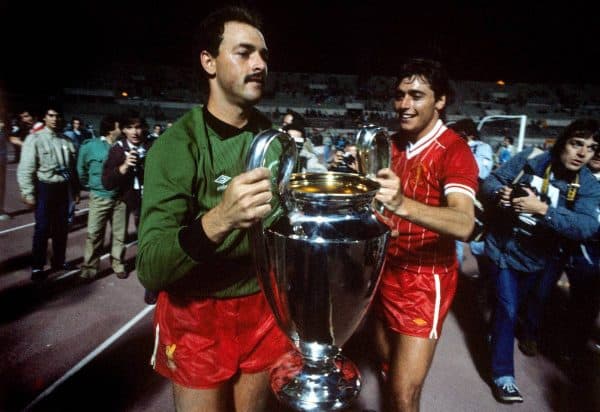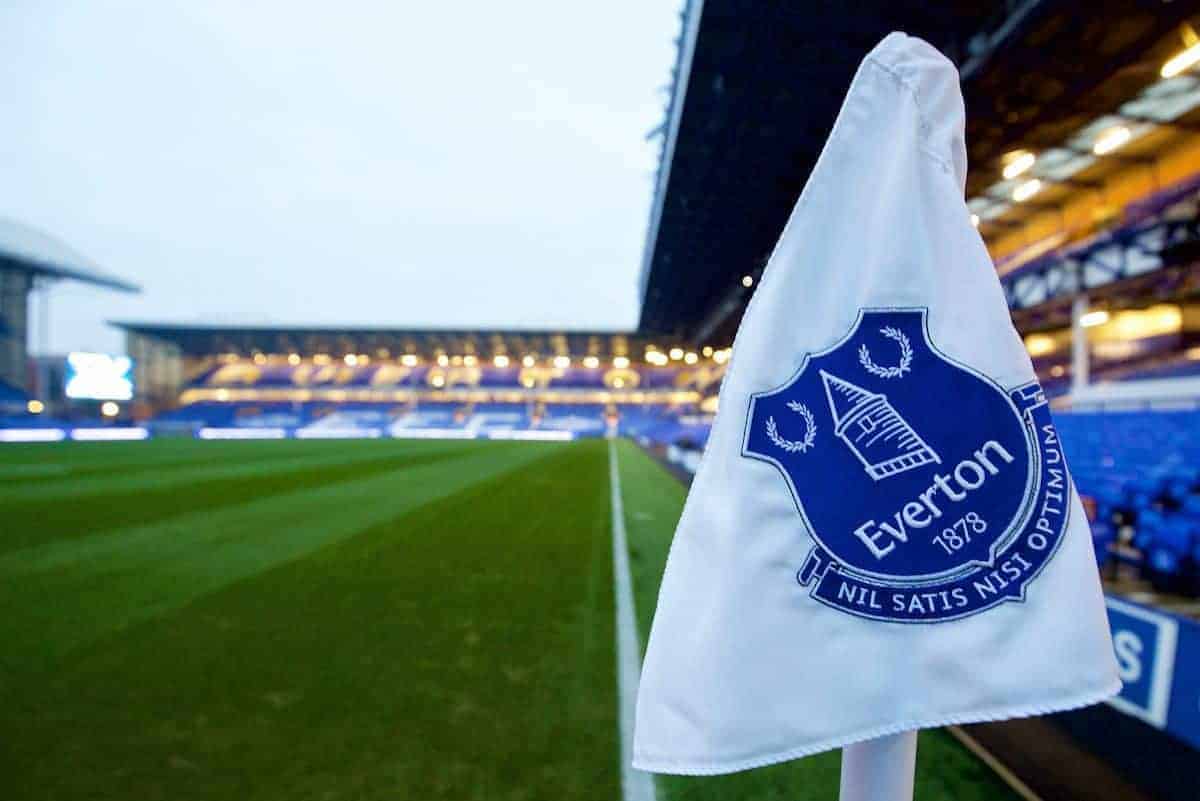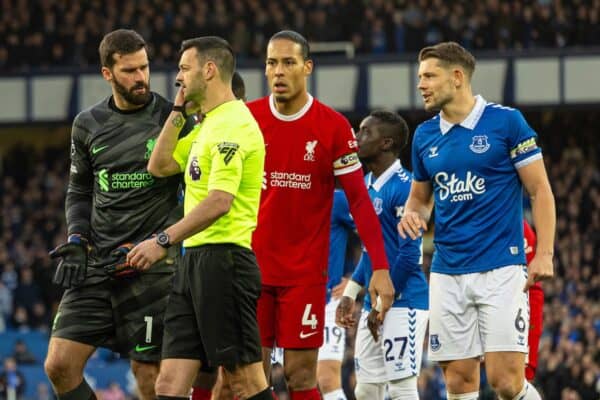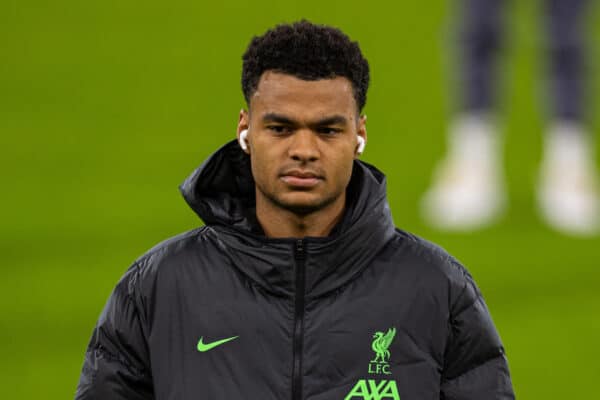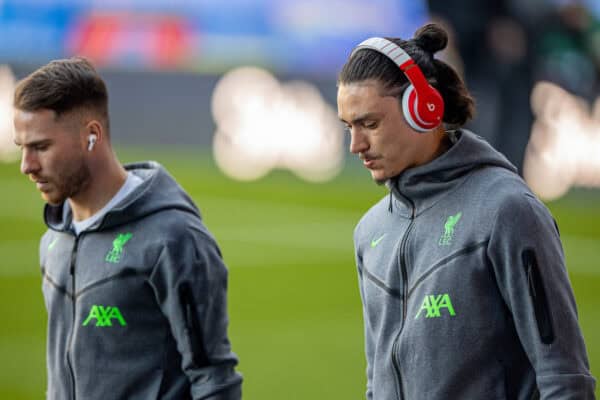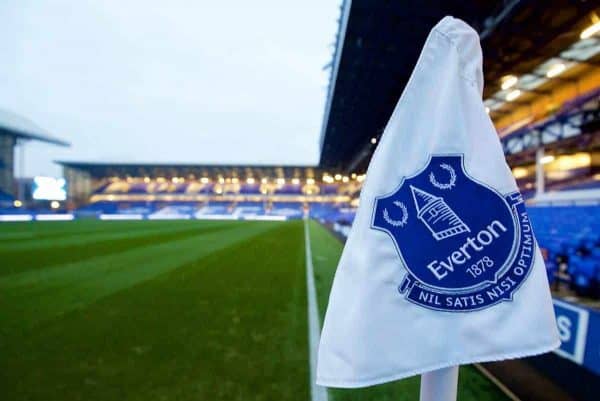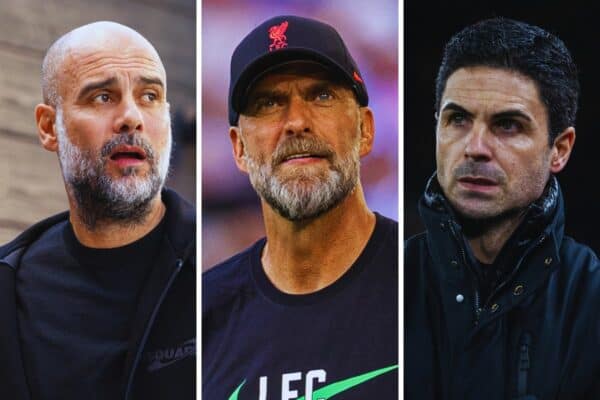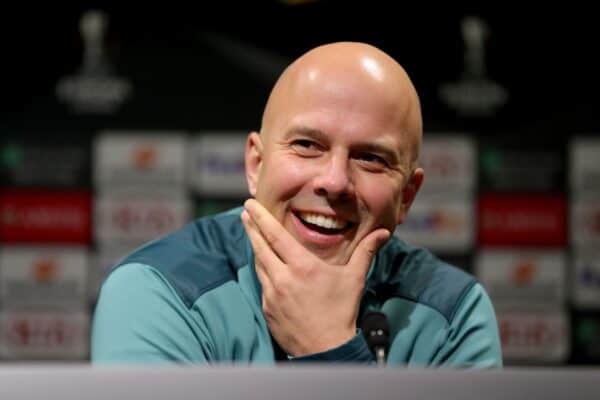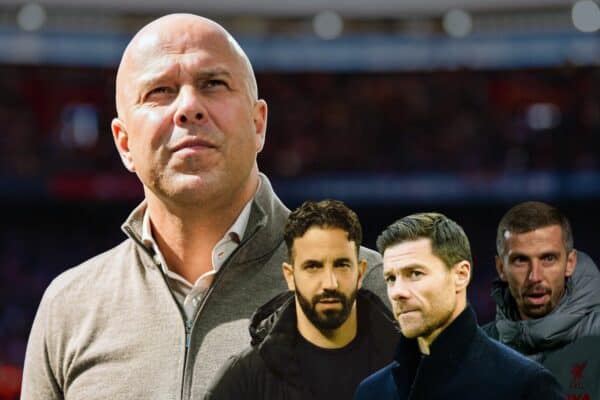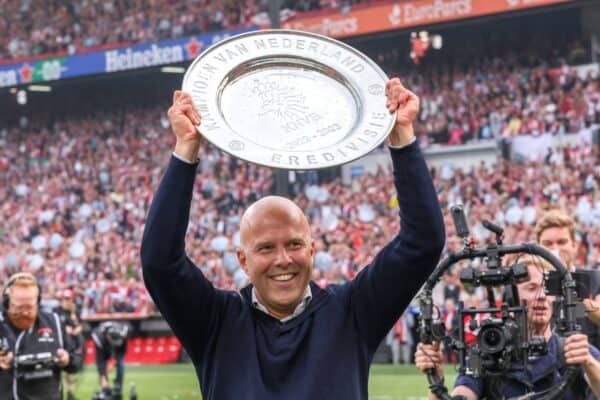Michael Robinson only played 30 league games for Liverpool, but left his mark in Anfield folklore all the same, writes Keith Perkins.
Players come and players go; it’s all part of the natural cycle of season-by-season renewal. For some players, it can be the chance of a lifetime when a big club comes calling, even though the reality is that it may only be for a short time before he’s on the move again.
Such was the case for Michael Robinson, who came to Liverpool as something of a stop-gap measure, and was then on his way elsewhere in only a little over a year later.
It was a golden opportunity for him, and even though he was at Anfield for only a short time, it was surely a very memorable time to have been part of Europe’s elite. It was to become the best and most successful season of his career, and the one that he will always have the fondest memories of.
Michael John Robinson was born in Leicester on 12th July, 1958. He made an early impression on the scouting staff of local clubs, and was soon signed as a schoolboy by Coventry City.
After a couple of years with clubs in the Blackpool Sunday League (Waterloo Wanderers, Dolphinstone FC) he signed on as an apprentice with Preston North End in July of 1974, just as the club were relegated to Division Three.
Bobby Charlton had been brought in as manager a year earlier but was unable to prevent the drop to the lower division. Former Everton player and manager Harry Catterick took over the reigns at Deepdale in the summer of 1975, and a year later, in July of 1976, he signed Michael to a professional contract.
Robinson had spent three seasons at Deepdale, making 48 first team appearances and scoring 15 goals, when Malcolm Allison offered the astounding sum (for those days) of £756,000 to take the young striker to Manchester City in June of 1979.
Allison was in his second spell with City, and was in the process of spending large sums of money to rebuild the club, who were at that time in a period of slow decline.
Allison was impressed with Robinson’s uncomplicated style of play. His constant running and movement off the ball were thought to be one more piece in the construction of a new and improved City squad.
It was a huge gamble for Allison to take a largely unknown (and unproven) young player up to the First Division. It was to be a disappointing period for Michael, with only 8 goals in 30 appearances.
It was always going to be difficult to live up to the expectations that such a high transfer fee would demand, and in the summer of 1980 he was sold to Brighton and Hove Albion for £400,000.
Brighton had just finished their first season after promotion to the First Division, and were looking to strengthen the squad with a few well chosen players to ensure their survival in the top flight.
The 1980-81 season saw the club mired in the lower places and threatened with relegation for much of the season, but a late string of good results allowed them to survive and avoid the drop.
The next season was more successful, with most of the campaign spent in the upper half of the table. Former Liverpool player Jimmy Case had been signed over the intervening summer, and was highly influential in putting together the run of form that kept them in contention along with the bigger clubs.
That unfortunately was to be the highest point that they would reach, with the following season seeing the Seagulls in a continual battle for survival.
The season ended in disappointment with relegation to Division Two, but also with an appearance in the FA Cup final to face Manchester United. Robinson played well in the final, contributing to a 2-2 result at Wembley that forced a replay, which United won 4-0.
Robinson’s performances with Brighton, and especially in the FA Cup, were impressive enough for several clubs to become interested in signing him, with Manchester United, Newcastle United, and Seville among the clubs to approach him.
Regardless of how many clubs were seriously interested, it was Liverpool’s newly promoted manager Joe Fagan who came in first with a firm offer. Ian Rush had been struggling a little with injuries during the pre-season schedule, and Fagan brought Michael to Anfield as cover during Rush’s absence for a fee of £200,000.
His performances with Brighton were also impressive enough to earn a call up to the Republic of Ireland squad, eventually earning a total of twenty four caps (five while with Liverpool) and scoring six goals.
Michael Robinson’s Liverpool career began with a return to Wembley to face Manchester United once again, this time in the Charity Shield.
The result was another loss and another Runner-Up medal, but it was to be the start of a memorable season with the Reds. Your browser may not support display of this image.
Kenny Dalglish was being used by Joe Fagan in a deeper position, and so Robinson was partnered with Ian Rush up front. The pairing of the two wasn’t an immediate success, and it was ten games into the season before he scored his first goal for the Reds.
That was in a European Cup match against Odense BK, where he scored two in the second leg at Anfield. His next goal then came a week later in a League Cup match at Brentford.
Ten days after that, it looked like the floodgates were about to open as he scored again. That was against West Ham at Upton Park, where he made his intentions clear by not only scoring his first league goal for the club, but added two more to make it a hat-trick.
Suddenly after a ten game drought, he had now scored six in the space of a month, which was a very respectable six goals in thirteen appearances. The Rush-Robinson pairing was now paying off, with Michael describing it as:
‘œIan Rush made me look brilliant in the air. When I jumped up and headed, the ball would always go to Rushie. He could read my body; the way I jumped up Ian would deduce where the ball would go. He worked it out before I had. Rush never knew which bloody knife or fork to use, but on the pitch he was a genius.’
Robinson was never seen as an artistic type player with a delicate touch on the ball. Rather, he played to his known abilities which meant that he could move quickly into space, ready to receive the ball by running on to it, and then make use of it quickly.
He spent large periods of the match chasing down the flanks, leaving the middle of the park to Rush and/or Dalglish. Joe Fagan then began experimenting with various combinations in attack, which meant less playing time for Michael.
In spite of this, he scored three more goals before the year was out, and then began the New Year with a goal in the FA Cup against Newcastle. Liverpool were now competing on four fronts, with steady progress in three of the four competitions.
Ironically, Liverpool were knocked out of the FA Cup in the 4th round by his former club Brighton.
By the end of March of 1984, he had played in twenty four League matches, six European Cup matches, two FA Cup matches, and eight League Cup matches.
Then came the League Cup final at Wembley against Everton. This was the first time that the two Merseyside clubs had met in a Wembley final, but it was not to be the most memorable occasion for Liverpool or for Robinson.
He came on as a late substitute in extra time as the two sides played out a scoreless draw. The replay at Maine Road a few days later saw Liverpool prevail 1-0, with Robinson on the bench as an unused substitute.
Progress continued in the League, with Liverpool wrapping up their fifteenth championship by the end of the season. After that, with two domestic trophies already in hand, Liverpool set off for the Stadio Olimpico in Rome to play AS Roma in the European Cup final.
This would be Liverpool’s fourth appearance in the final, and Joe Fagan‘s first in his first season in charge. Robinson was on the bench once more for the start of the match, but with the score even at 1-1 after ninety minutes he was brought on to replace Kenny Dalglish five minutes into extra time.
iverpool went on to win on penalties, completing a unique treble of trophies both domestically and in Europe. Joe Fagan‘s squad had unbelievably surpassed even Bill Shankly and Bob Paisley, who had both managed to win one domestic and one European trophy in the same season.
For Michael Robinson it was a dream come true for a player who had been written off as a failed signing by Manchester City a few years earlier, only to go to Brighton and face relegation, and then a year later to be picking up medals galore.
Unfortunately, that was to be the beginning of the end of the dream as the new season began with more changes to the squad.
Robinson made few first team appearances as the 1984-85 season progressed, with only a handful of starts (seven out of nineteen).
His only goal of the season came in his first start, which was a League Cup match at Anfield versus Stockport County. By the end of the calendar year, it was obvious that his opportunities would be few and far between and so it was that he left Anfield for Loftus Road in December of 1984, signing for Queen’s Park Rangers (for a fee of £100,000) in preference to playing out his time with the reserves.
Just as it was Robinson’s former club Brighton, with former player Jimmy Case who knocked Liverpool out of the FA Cup the previous season, it was son to be the turn of his new club, QPR, to knock them out of a cup and prevent Liverpool from taking another treble.
Kenny Dalglish had replaced Joe Fagan as player-manager at the end of the 1984-85 season, and went on to immediate success in winning the League and FA Cup ‘œDouble’ in his first season.
It was close to being a treble success domestically, but QPR edged the Reds on away goals in the League Cup semi-final. However, it was to be another runner-up medal for Michael as Oxford United won 3-0 in the final over QPR.
Michael spent one more season with QPR and then left to join former Liverpool and QPR player Sammy Lee at CA Osasuna in Spain.
He spent two years in the Spanish League, making a total of fifty nine appearances and scoring twelve goals. It soon became clear that he had made a wise decision to move to Spain, as he immersed himself deeply enough in the culture to become fluent in the language, just as Sammy Lee had done previously.
In the summer of 1989 he decided it was time to retire from football and was able to use his language ability to take on the role of football commentator and analyst on Spanish radio, presenting the programme ‘El Larguero’ for radio station Cadena Ser.
He went on to write, produce, and present ‘El Dia Despus’ (The Day After), which was described as: ‘A celebration of the culture, passion, and madness of Spanish Football.’
During the reign of Gerard Houllier, he was asked his opinions on the Liverpool manager and the club, and in particular the role of Michael Owen. His response was eerily foretelling:
Michael Owen is one of the reasons Liverpool are crap. Houllier has built a whole team around him and it’s not fair on him, it’s not fair on the team, and it’s not fair on the victims like me who watch it. At Real Madrid, Owen would be a substitute.
Robinson later took on an extra role as Director of Football at Cadiz, while still working as a commentator and analyst with Canal Plus.
During preparations for the season’s opening match against Real Madrid, he let it be known that he would not be able stay calm if Cadiz managed to surprise the galacticos with a win.
Michael Robinson’s time with Liverpool may have been short, with no more than about 50 appearances over a season and a half, but he still has very fond memories of the club where he picked up multiple medals.
At the end of the 2004-05 season, he was working for Spanish television in their coverage of the Champions League and made the trip to Anfield to cover the Liverpool v Chelsea semi-final.
His love for Liverpool showed through with his lack of impartiality during his commentary. When the match ended, and Liverpool were on their way to Istanbul for the final, his co-presenter Carlos Martinez had to explain, “Liverpool are in the final but Michael can’t speak, he’s crying too much.”
A couple of years later, Michael Robinson made an emotional trip back to Anfield as the presenter of a special feature on Fernando Torres and the Spanish influence at Liverpool.
